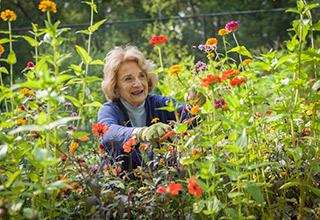Easing Seasonal Tensions: A Guide to Holiday Stress Relief for Seniors
Learn to recognize warning signs and how to help keep the season festive.

The holiday season often brings to mind classic tunes such as “It’s the Most Wonderful Time of the Year.” Echoing through shopping malls and holiday parties, the song paints a picture of joy and festivity. Yet for many people, the reality of the season doesn’t match this cheerful portrayal. The expectations and logistics surrounding the “most wonderful time of the year” can cause stress for even the most optimistic and resilient among us. While the holidays can be emotionally challenging at any age, older adults often find themselves in new territory that can trigger a stress response.
Why holidays can be stressful for older adults
Coping with loss: One of the biggest challenges that comes with aging is loss. As time passes, families inevitably experience changes due to illness and death, leaving noticeable absences in gatherings where loved ones once brought joy and companionship. Holiday celebrations start to look very different, which can lead to sadness and in some cases even depression.
Dealing with change: Change that comes with the passage of time impacts how and where holiday gatherings can happen.
As a social worker at Hebrew SeniorLife’s Orchard Cove in Canton, MA, I am often asked by residents and their families for help making decisions or finding solutions when they face issues that challenge their sense of emotional wellbeing. I’ve heard residents say “It’s too hard to get to my family’s house.” As people get older and become more vulnerable to age-related disabilities, it can become more difficult to travel and to negotiate adult children’s homes where there might be stairs or other obstacles.
My father was on oxygen before he passed away and he and my mother were both using walkers to get around. I remember before one holiday, my brother had just moved into a new home in New Jersey and my father wanted to see it. So, I took them both down for the holidays. My siblings and I all remember the last time he was able to visit with us at my brother’s new home as a wonderful time together and were grateful, but it was logistically difficult for everyone.
Meeting expectations: Family dynamics become particularly apparent during the holidays. Expectations around what celebrations should look like are often based on an idealized image of a happy, loving, and joyous family. What you imagine your family should be and what it is are all too often not the same. Witnessing conflict can be very stressful for older family members.
Navigating the holiday season can be a complex juggling act, especially when balancing the care of older loved ones with commitments to other family members, work responsibilities, and household duties. Self-care may take a back seat and intensified sibling dynamics can spark questions like "Who will be there for Mom and Dad?" Kids and grandkids may move away and lose the ability to participate in family traditions. The lively energy that young children bring to the party doesn’t last forever.
Constant reminders: It seems like the holiday season begins earlier each year. We’ve hardly put away the beach umbrella when the decorations go up in the stores, commercials showcasing joyous holiday gatherings start airing, and plans for New Year’s Eve begin getting made. If you’re grieving the loss of loved ones or coping with changes that impact traditions, the constant reminders can trigger sadness and stress.
Winter in general can be challenging for older adults. Beyond the holidays themselves, the winter months can cause people to feel down and to isolate. Many people experience seasonal affective disorder.
Older people in particular are at risk of falling when snow and ice become an issue, which may cause them to become anxious and homebound.
What are the symptoms of holiday stress?
Here are some of the signs I look for that indicate someone may be experiencing holiday-induced stress:
- Feeling so down you can’t shake it off
- Too little or too much sleep, or sleep disturbances through the night
- Changes in appetite
- Difficulty concentrating
- Changes in mood, such as irritability, or being tearful
- Lack of interest in socializing or engaging with others
How you can change holiday stress into holiday joy
It’s important to keep in mind that the holidays can also be a time of great joy. Many older people look forward to it, and if you’re one who takes the “best time of year” view, now is the time to indulge. For those who are struggling, here are some steps you can take to brighten the holidays and lift your spirits:
- Express yourself: Don’t keep your feelings bottled up inside. A good cry with someone you trust might be just the release you need. If you have recently experienced loss, talking with others who are grieving can help. If you think you’re experiencing depression, contact a professional for evaluation and treatment.
- Set realistic goals: Keep things simple. By acknowledging changes that come with age, adjusting expectations can go a long way toward reducing holiday stress. Observing the holiday with smaller gatherings that require little or no preparation can be just as fulfilling as past extravaganzas.
- Stay in contact: If you can’t be with your family in person, or if attending or organizing a large family gathering is too much for you, use technology like FaceTime or Zoom to celebrate. You can have dinner together and celebrate other traditions like trimming the tree or lighting the menorah.
- Volunteer: For people who are active and able, find ways to volunteer. If you don’t have family yourself, it brings joy to others when you volunteer at a homeless shelter or at a community center dinner. Volunteering is so important because it brings joy to the volunteer as well as to the recipient and it gets you out of the house.
- Reminisce: Talking about people who are no longer with us is important. Keeping another person’s memory and image alive during the holidays can help maintain a sense of tradition. Trading stories like “remember the corny jokes Uncle Sam used to tell the kids at the table” provokes fond memories and brings comfort. Light a candle for a loved one who has passed or propose a toast to their memory.
- Create new traditions: While observing past traditions may be too stressful, or no longer possible, it doesn’t mean you can’t start new ones. Consider making a list of things for which you’re grateful and sharing it with a friend; organize a cookie swap with neighbors; tap your DIY potential and express your artistic inclination by crafting a holiday-themed decoration or family photo album; or start a journal, where you can reflect on the past and those you loved. Simply spending time to quietly reflect on your life and generate gratitude is a profound tradition to cultivate.
- Mind your health: If you’re feeling unusually sad or stressed, you may want to contact your primary care physician to discuss your symptoms, and make sure other factors are not in play such as clinical depression, or grief that can be treated with counseling.
- Exercise: Take a brisk walk or swim to alleviate stress and anxiety. Exercise has long been recognized as a great stress reliever.
- Try meditation: Meditation offers techniques that help you relax, cope with emotions like sadness and grief, and teaches you how to become friends with your emotions.
Support and community in senior living
The beauty of living in a senior community like Orchard Cove is that residents actually seek each other out during the holidays. Many of our residents opt to stay here rather than go to family because they enjoy being with good friends who’ve made the same choice. Spending the holidays in their new home with good company is an example of a new tradition that can be just as fulfilling as those from the past.
Ready to transform holiday stress into holiday joy?
The holiday season should be a time of warmth and cheer, especially for older adults. If you or a loved one are experiencing the stress and challenges that may come with this time of year, you're not alone. At Hebrew SeniorLife, we understand the unique needs of seniors and offer support to make this season truly the most wonderful time of the year. Call us at 781-859-3088 or contact us online to learn about our senior living communities including Orchard Cove in Canton, MA, and NewBridge on the Charles in Dedham, MA.
Blog Topics
Learn More
A Community for Residents, By Residents
Orchard Cove, in Canton, MA, offers living options that span the full continuum of care, including independent living. The community is bustling with activities, from life-long learning to entertainment.





